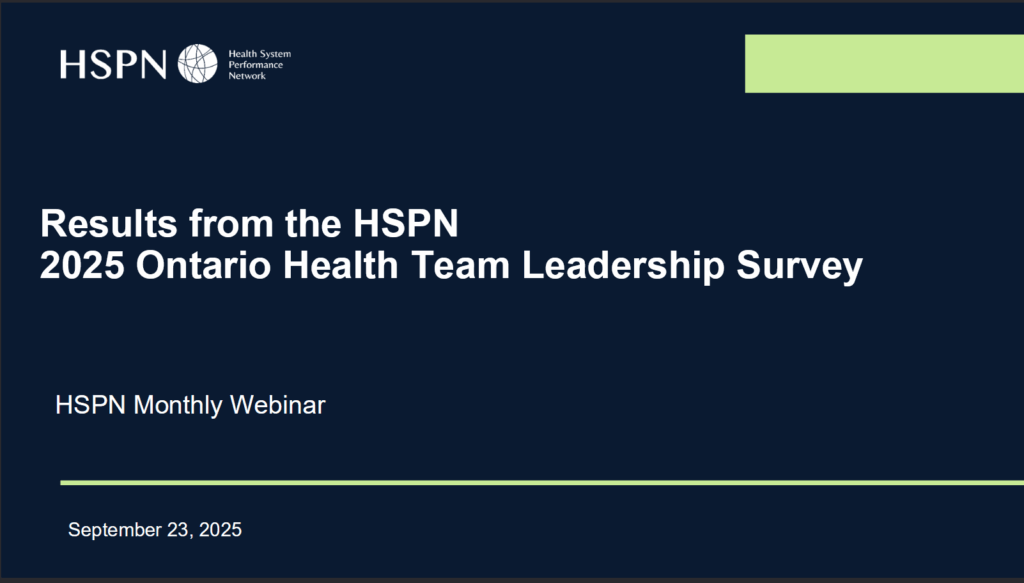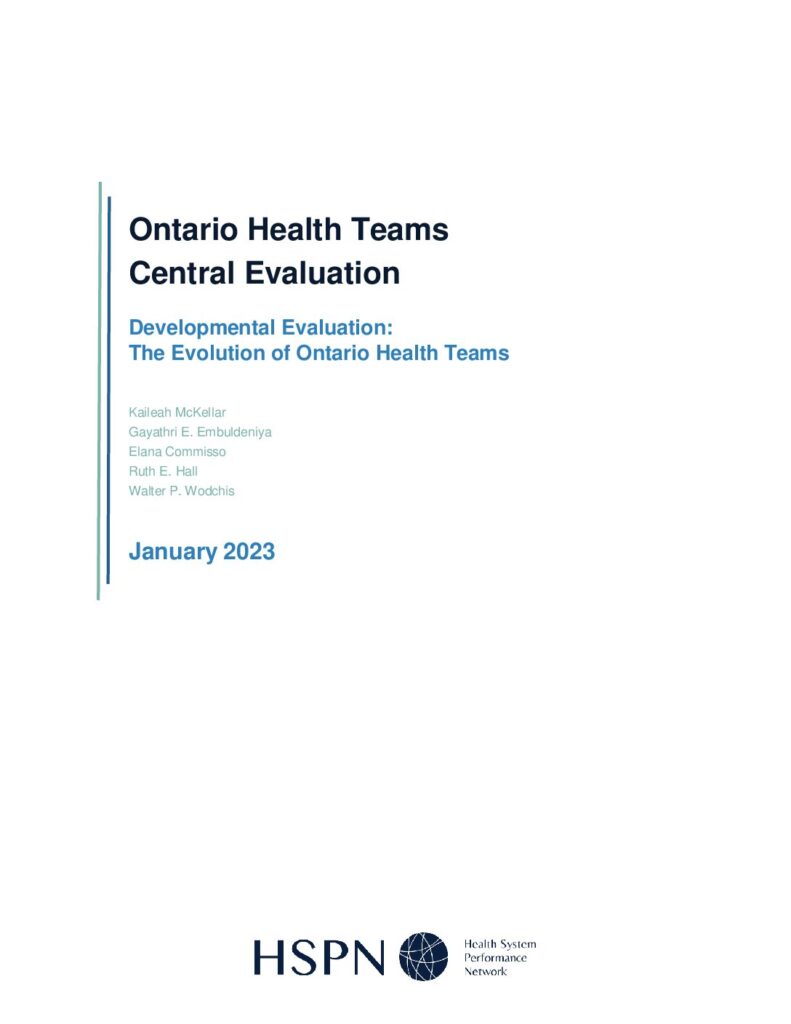On this page:
Feature Highlights:
Ontario Health Team Leadership Survey Results
Provincial Results

ALIGN Program of Supports
Coming soon – The ALIGN Program (Advancing Leadership and Integrated Governance Networks), formerly the ADVANCE Program, is one of the Ministry’s Central Support Programs to OHTs. Please check back to learn more about our program and to access helpful resources for OHTs

Webinars

Managing Performance in an Integrated Care Network: Actioning Performance Measurement
As Ontario Health Teams evolve, their ability to measure, interpret, and act on performance data is central to achieving integrated care. On October 28, 2025 we are turning attention to explore how OHTs are approaching performance management and performance measurement. […]

Ontario Health Team Leadership Survey Results
The September 2025 HSPN webinar focused on the results from the 2025 HSPN Organizing for Ontario Health Teams Leadership Survey. More than 850 senior leaders across 55 OHTs responded to this survey, providing insights into the partnerships, trust, collaboration, and […]

Local Innovation in Population Health: Lessons from the LDPHM Initiative
Join us this July for a dynamic webinar exploring the Locally Driven Population Health Models (LDPHM, formerly known as the High Priority Community Strategy) initiative in Ontario. This session will provide an overview of the LDPHM approach, share key areas […]

Adaptive Leadership in Integrated Care: Strategies for Ontario Health Teams
HSPN partners with ALIGN to explore the essential role of adaptive leadership in advancing integrated care. Adaptive leadership enables teams to navigate complexity, support staff through change, and foster inclusive decision-making processes. While technical changes often receive the spotlight, it’s […]

Integrated Care Pathways – Exploring the Building Blocks for Success
In April 2025, HSPN’s monthly webinar will delve into Integrated Care Pathways (ICPs), focusing on the key building blocks that contribute to their success. We will hear from Ontario Health Teams, East Toronto Health Partners, Burlington OHT, and Frontenac, Lennox […]

Leading Projects in Home Care
Watch our March webinar for an insightful discussion on the future of home care modernization. Discover innovative models of care, learn effective evaluation strategies, and explore baseline indicator data. Hear from the HSPN evaluation team, and have the opportunity to […]

Population Insights from Patient Reported Data: PREMs and PROMs
In February 2025, HSPN’s monthly webinar will focus on the use of patient surveys in primary care. The event will provide knowledge of the international focus on patient-reported data in the OECD Patient Reported Indicator Survey, including results from Canada […]

Learning Health Systems in Ontario Health Teams: What is the current Capability? And what are the Accelerants and Brakes?
From April to December 2024, the HSPN facilitated a series of webinars on the Learning Health System. Hundreds of collaborators participated in these events and thousands have watched afterwards. You can review these events on the HSPN OHT webinar page […]

Topic: Supporting Evaluation in Learning Health Systems: What do OHTs need to know?
Join our “Supporting Evaluation in Learning Health Systems: What do OHTs need to know ?” On November 26th, 2024 from 12:00-1:30pm EDT. This webinar will provide an overview of introductory and advanced issues related to evaluation of health programs and […]

Considering Implementation in Learning Health Systems: From Research to Routine Practice
Join our “Considering Implementation in Learning Health Systems” webinar this September. This webinar will provide an introduction to knowledge translation and implementation science methods. Using a project that implemented fascia iliaca blocks as a pain management method for hip fractures […]

Co-Designing Health Solutions: Engaging Patients, Families, and Providers for Effective Implementation
Join our webinar, “Co-Designing Health Solutions,” to learn how direct engagement and co-design with patients, caregivers, families, care providers, and community members can drive successful implementation of health services. Explore strategies for inclusive collaboration and discover the impact of co-designed […]

Using Evidence in the Learning Health System
This webinar explores how to locate or undertake rapid syntheses of existing evidence to regarding the success or failure of solutions applied to the problems you are trying to solve in your Ontario Health Team. We are host to global […]

Using Data to Inform OHT Activity: The first stop of the Learning Health System
This month the HSPN OHT webinar focuses on the use of data to inform OHT activity. This is the second in the Learning Health System (LHS) webinar series. Here we focus on the first “gear” of the action framework for […]

What is a Learning Health System?
This month we introduce a series on the Learning Health System (LHS) . This approach blends research with health care operations to speed the generation, synthesis, uptake, and refinement of evidence to improve population health, equity, patient experience, health workforce […]

Furthering our Understanding of Equity in the Ontario Health System
Join us this month as we address five distinct health equity-related questions identified by the Ministry of Health. These relate to research questions like how to measure health equity for health system performance and what types of data are needed […]

How Does Policy Support Integrated Care? International Examples, Ontario Practice
Health systems around the world are aligned in aiming to improve on quadruple aim goals of patient and provider experience, health outcomes and value creation. Health systems are also pursuing these goals through the advancement of population health and integrated […]

New Data on Improvement Indicators for OHTs
Interested in learning more about how the improvement indicators progressed in Ontario Health Teams? Join us this January for an update about improvement indicators and how they’ve progressed in OHTs. The Health System Performance Network first produced a set of […]

How are OHTS Advancing in Digital Health
How are OHTs fairing with digital implementation? Join us for our upcoming November webinar session, where we will learn about the implementation successes and pivots of Ontario Health Teams in implementing digital solutions. Dr. Andrew Sarta will reflect on the […]

IFIC Canada Virtual Community Care
What is the relationship between integrated care and patient/caregiver engagement? How can engagement with our communities and people with lived healthcare experiences inform and improve integrated systems of care? Join us for a thought-provoking panel to learn about current practices […]

Interventions to Address Inequities in Ontario Health Teams
We close our 4-part series on health equity in Ontario Health Teams with a focus on action! Building on our understanding of equity (April 2023), building capacity for equity (May 2022), and measuring equity (June 2022), this September Webinar will […]

Measuring Equity
Measure what matters so that what matters is attended to. This webinar will review and discuss approaches to measuring health equity and using health equity measurement to advance health equity in integrated delivery systems. In this session: Jessica Morgan from […]

Building Capacity For Equity Work in Ontario Health Teams
How do Ontario Health Teams develop and strengthen their skills and capabilities to address health inequities in their communities? What resources are critical to achieving equity work? What strategies did Ontario Health Teams enact to successfully carry out their equity […]

Advancing Health Equity in Ontario Health Teams – A Primer
What is health equity as it relates to Ontario Health Teams? How can OHTs advance health equity? How can OHTs measure and track progress on health equity? In this webinar we will discuss terminology and definitions of health equity and […]

Advancing Integrated Care with Digital Health Innovation
IFIC Canada Co-Leads Jodeme Goldhar and Walter Wodchis invite you to join our next IFIC Canada Virtual Community Session on March 28, 2023 from 12:00 PM-1:30 PM EST. This session is a collaboration between the International Foundation for Integrated Care […]

Sense Making Population Health Management in Ontario Health Teams: A Diabetes Example
Ontario Health Teams are intended to hold fiscal and clinical accountability for an attributed population defined by primary care attachment and hospital referral and use patterns. OHTs will integrate care and use equity-based population health management approaches to deliver better […]

IFIC Canada and Health System Performance Network virtual community
ntegration is the lever to enable population health and well-being. A key component of integration is the role of partnering with the volunteer sector to improve outcomes for our patients, caregivers and our population. In this session, we will take […]

Results from the HSPN Developmental Evaluation: Advancing toward Maturity
After nearly 3 years of the OHT initiative, we are asking how OHTs are developing and what is needed to advance toward maturity. Grounded in the experience of 6 OHTs participating in the HSPN Developmental Evaluation, in October’s HSPN webinar, […]

Leadership Survey Results
In 2022, HSPN is hosting a series of events on Quadruple Aim Measures for Ontario Health Teams. How have OHTs progressed in the first two years? What are the areas of strength which OHTs can build on and where are […]

Quadruple Aim Measures for Ontario Health Teams: Health Care Costs & Value
In 2022, HSPN is hosting a series of events on Quadruple Aim Measures for Ontario Health Teams. In July, we will review opportunities to measure and leverage health care costs and to create value by improving patient experience and outcomes […]

Quadruple Aim Measures for Ontario Health Teams (Part III)
In 2022, HSPN is hosting a series of events on Quadruple Aim Measures for Ontario Health Teams. In June, we will review opportunities to measure health outcomes at the population and individual level using administrative and patient-reported data and how […]

Quadruple Aim Measures for Ontario Health Teams (Part II)
In 2022, HSPN is hosting a series of events on Quadruple Aim Measures for Ontario Health Teams. In May, we will gather for our second event focusing on Provider Experience. Come join us as Dr Ruth Hall and Elana Commisso […]

Quadruple Aim Measures for Ontario Health Teams (Part I)
In 2022, we are hosting a series of events on Quadruple Aim Measures for Ontario Health Teams (OHTs): April is Patient/Client Experience Month. Come join us as Walter Wodchis reviews the HSPN approach to patient experience measurement. Sarah Grace Bebenek […]

Stories from the Ivory Tower
In March, we are coming out with our stories from the ivory tower of university-based evaluation of Ontario Health Teams (OHTs). Evaluators from the HSPN have spent the better part of the past year observing the development of OHTs with […]

Segmenting your OHT Population: Stories from the Field (Part III)
In February, we will merge our streams of population health management and stories from the field providing real-world examples in Ontario Health Teams (OHTs) of using data to better understand where, how, and for whom interventions can be directed. Examples […]

Using Segmentation to Support Quality Improvement
In January, we come back again to segmentation for population health management, building on the February and September 2021 webinars. This time we will look at the new collaborative Quality Improvement Indicators and other areas for improvement across Ontario Health […]

Stories from the Field (Part II)
In November, HSPN is excited for the second in a series of events that focus on sharing stories from the experience of Ontario Health Teams. At this event, we focus on a few examples of teams that are looking at […]

Stories from the Field (Part I)
In October, HSPN is pleased to announce the opening of a series of events that focus on sharing stories from the experience of Ontario Health Teams. At this first event, we are focused on a few examples of teams that […]

How Population Segmentation applies to Population Health Management
In September, we come back to the topic of population segmentation with some insights on how population segments can be built and used. Debra Chen reviews how the Canadian Institutes for Health Information (CIHI) Population Health Grouper segments the population […]
Special Event: Q&A Session
In July, the HSPN evaluation team will host a series of special meetings in July to answer your evaluation questions. There will be four 45-minute interactive Q&A sessions beginning at 9:05 AM, 10:05 AM, 12:05 PM, and 1:05 PM on […]

How should we be evaluating integrated care?
In June, join us for a special event brought to you by the Health System Performance Network, in partnership with the International Foundation for Integrated Care –Canada, and Emerald Publishing. With leading practices from the Netherlands, England and Canada, we […]

Measuring Patient and Provider Experience: Completing the Quadruple Aim
In May, we discussed the measures of provider experience and for patient experience that we recommend for use in OHTs. We heard from providers and patients to talk about experience from their own perspective.

OHT Improvement Measures for Focus Populations
In April, we took a look at improvement measures for common OHT focus populations including mental health and end of life.

OHT Improvement Measures: Where are OHTs starting from?
In March, we looked across all OHTs at the baseline achievement on key improvement measures. What is the range of outcomes? Is there any association with socioeconomic deprivation?

Population Health Management
In February, we explored the topic population health management. What is it? How can you use population segmentation to direct efforts? Where in the world do they do this best ? How can we do it here in Ontario?

How to Measure OHT Success: Evaluation Metrics Using the Quadruple-Aim
In January, we discussed improvement measures to be used in the evaluation of Ontario Health Teams, both provincially and locally.

OHT Implementation: A Focus on Measures for Local Evaluation
How will you use your logic model to drive local measurement and reporting? Our November 2020 webinar focused on how to do this and showcased the way in which one OHT has implemented its logic model.

The Generation of Integration: Lessons Learned in Ontario, Canada
Ontario has experienced both successes and failures in past initiatives to integrate care. Our October 2020 webinar uncovers lessons and practical advice that will help us learn from our past.

Formative Evaluation for the 1st OHT Applicant Cohort
What are the areas of strength which OHTs can build on and where are there needs for supports? How are supports being organized to further OHT implementation? This month’s joint HSPN/MOHLTC webinar highlights findings from surveys and interviews completed by […]

Logic Models for OHTs
Interested in evaluation? Thinking about how to choose indicators and performance measures for your OHT? Do you have a logic model? Did you know you really should have one (or more)? HSPN introductory webinar to strengthen evaluation within your OHT.

OHT Evaluation
HSPN will play an important role with Ontario Health Teams in the coming years in undertaking a Central Evaluation of OHTs. An overview of the initial formative evaluation was provided at two webinars on December 17 and 19, 2019.
Explore OHT Resources
Resources
White Papers and Guidance Materials Resources
Surveys
The Health System Performance Network has developed new surveys of patient and provider experience for the evaluation of Ontario Health Teams. HSPN aims to have a quadruple aim framework for evaluation and these are two critical dimensions of this evaluation.
HSPN will continue to support these surveys until January 2023
FAQs
You should start with all providers and patients that you are seeking to be involved in implementing new models of care in your OHT and eventually expanding to all providers and patients involved in any aspect of your OHT.
You should start as soon as possible to get a baseline measure prior to implementing the new models. Expect to administer annually to check in and monitor changes in provider and patient experience.
Recent OHT Publications

OHT Central Evaluation, Developmental Evaluation: The Evolution of Ontario Health Team
2023

[Webinar] Measuring Equity
2023

Measuring Equity
2023

